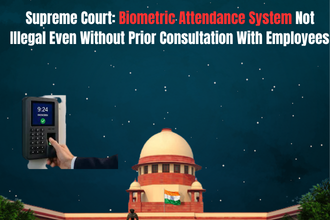In a significant development, the Supreme Court of India on April 8, 2025, sharply questioned the Enforcement Directorate (ED) for filing a writ petition under Article 32 of the Constitution, seeking transfer of the Nagarik Apurti Nigam (NAM) scam case from Chhattisgarh to Delhi. In a remark laced with wit but bearing deep constitutional implications, the Court stated: “If ED has fundamental rights, it should think about the fundamental rights of people too.”
This article delves into the legal background, the Supreme Court’s observations, the implications of the ED’s petition under Article 32, and the broader context of government accountability under constitutional principles.
Background of the Case: The NAM Scam and ED’s Allegations
The case pertains to a 2015 corruption scandal involving the Nagarik Apurti Nigam (NAM), where large-scale irregularities were allegedly committed in the procurement and distribution of rice meant for public welfare schemes in Chhattisgarh. One of the key accused is Anil Tuteja, a former Indian Administrative Service (IAS) officer, who the ED alleges maintained close ties with the then ruling political establishment.
The ED has alleged:
- Political interference in the investigation.
- Misuse of prosecutorial discretion.
- Intimidation of witnesses.
- Leaking of prosecution strategy and evidence, including call records and WhatsApp chats, to the accused.
According to the ED, these factors necessitated a transfer of the trial to the Special Court (PMLA) in New Delhi to ensure a fair and impartial adjudication.
Article 32: Who Can Invoke It and Why the ED’s Petition Was Unusual
Article 32 of the Indian Constitution provides the right to constitutional remedies and allows individuals to directly approach the Supreme Court for enforcement of fundamental rights. However, this right is conferred upon citizens and individuals, not upon government bodies or agencies.
The Supreme Court questioned the maintainability of the ED’s writ petition under Article 32, pointing out that:
- Writ petitions under Article 32 are filed against the State or its instrumentalities.
- The ED itself is a government agency, making its invocation of Article 32 constitutionally odd.
- Filing such a petition blurs the distinction between the State and citizen, defeating the very purpose of fundamental rights protections.
In response, Additional Solicitor General SV Raju, appearing for the ED, promptly withdrew the petition, acknowledging the Court’s concern.
Supreme Court’s Observations: Satire with Serious Undertones
While disposing of the petition, the Supreme Court remarked:
“If ED has fundamental rights, it should start worrying about the fundamental rights of people too.”
This statement, though made in a light-hearted tone, carries a serious message. The Court underscored the responsibility of government agencies to uphold citizens’ fundamental rights, especially when such agencies wield enormous powers under statutes like the Prevention of Money Laundering Act (PMLA).
The Court’s observations also reflect a growing concern about:
- Executive overreach by investigative agencies.
- The potential misuse of procedural powers to target individuals selectively.
- Lack of accountability and judicial checks on coercive actions like summons, arrests, and prolonged investigations.
Previous Criticism by the Supreme Court
This is not the first time the Supreme Court has pulled up the ED in connection with the Anil Tuteja matter. Earlier, the Court had criticised:
- The manner in which Tuteja was summoned and arrested.
- The lack of transparency and fairness in ED’s functioning.
- The timing of summonses and arrests which often coincided with politically sensitive moments.
Such repeated scrutiny by the judiciary underscores a pattern of concerns regarding the independence and integrity of enforcement mechanisms in politically charged cases.
Legal and Constitutional Implications
The Supreme Court’s handling of the ED’s Article 32 petition highlights multiple constitutional issues:
- Separation of Powers: Government agencies must act within the confines of the Constitution. Invoking Article 32 by the State against the State disrupts the balance between the judiciary, executive, and legislature.
- Abuse of Process: The use of writ jurisdiction for purposes unrelated to fundamental rights enforcement could be seen as forum shopping or an attempt to bypass statutory safeguards.
- Government Accountability: The judiciary continues to be a crucial check on executive power. When enforcement agencies begin to act like aggrieved litigants rather than neutral investigators, it raises red flags about their objectivity.
- Citizens’ Rights vs. Agency Power: The remark about the ED thinking about the rights of the people is a reminder that State power must always be exercised with restraint, especially when it concerns individual liberty.
Political and Social Ramifications
The NAM scam case and the ED’s petition must also be viewed in the broader political context of Chhattisgarh, where a change in government in 2018 allegedly led to a dilution in the investigation, according to the ED. The petition had pointed to the grant of anticipatory bail to key accused like Tuteja as a sign of this shift.
However, the Supreme Court’s reaction suggests that such allegations alone are insufficient grounds to justify a transfer of trial, especially when done through a constitutionally improper route like Article 32.
This incident may further ignite public debates around:
- Politicization of investigative agencies.
- The erosion of institutional credibility.
- The need for judicial reforms to insulate enforcement processes from political pressures.
Conclusion: A Wake-Up Call for Government Agencies
The Supreme Court’s stance in the ED’s Article 32 petition in the NAM Scam case sets a vital precedent. It reminds enforcement agencies that:
- Their powers are not above the Constitution.
- They cannot misuse legal provisions meant for citizens to further institutional goals.
- Transparency, accountability, and fairness must be the cornerstone of their functioning.
By questioning the ED’s motives and methods in a constitutionally sensitive manner, the Court has reiterated that rights of the people cannot be subordinated to the convenience of the State.


